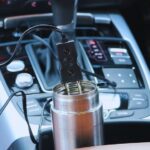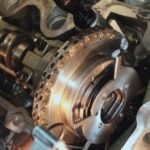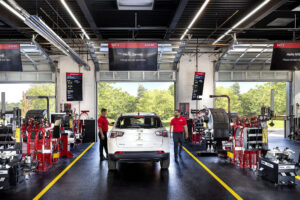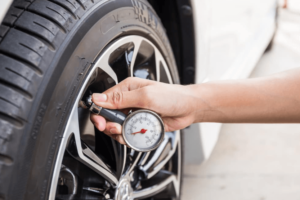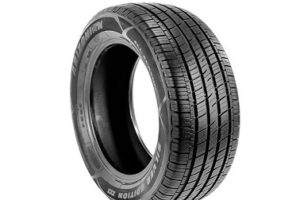Dead car batteries, flat tires, and worn brakes are common issues experienced by drivers. Those problems are familiar, and we know how quickly you can resolve them. But how long does it take to replace a wheel bearing?
Replacing a wheel bearing located in the rear portion of the vehicle will take 20 to 45 minutes. The time required ranges from 25 minutes to an hour if the wheel bearings and hubs are bolted to the car. Replacing a front wheel bearing will take around 30 to 90 minutes. Wheel bearings for rear-wheel-drive or 4-wheel-drive vehicles can take hours to replace properly.
Wheel bearings are small components relative to the rest of the vehicle, but they are essential. You must act immediately to replace a problematic wheel bearing because that lone component can cause some serious issues. Patience is required to replace one of your wheel bearings, but you don’t have much choice.
Read on to learn more about how long it will take to replace a wheel bearing, that component’s importance, and other relevant details.
How Long Does It Take to Replace a Wheel Bearing?

Replacing a wheel bearing as soon as possible is essential. It’s essential for two reasons.
First off, you need to replace that wheel bearing immediately because your car won’t be completely safe to drive while it’s there. The bad wheel bearing will make your car harder to control, and certain parts will sustain damage faster.
Taking your car to the mechanic right away is also highly recommended to evaluate the severity of the issue. The nature of the repairs that mechanics must do will differ based on which wheel bearing presents the issue.
Rear-Wheel Bearing Issues
The issues currently plaguing your vehicle could be related to the rear-wheel bearing. If that’s the case, the amount of time wheel bearing replacement will take could vary significantly. Replacement time will change based on the wheel bearing attached to your vehicle.
Bolted rear-wheel bearings are harder to replace. So, the mechanic will need more time to remove the old bearing and install its replacement. In total, it will take them 25 to 60 minutes.
It is easier for mechanics to replace unbolted rear-wheel bearings. Typically, a professional mechanic can remove wheel bearings that aren’t connected to your vehicle in about 25 minutes. At most, a mechanic may need 45 minutes to finish that particular task.
Replacement times will vary, but they will mostly stay within that range. Keep that in mind as you figure out when to take your car to the auto shop.
Front-Wheel Bearing Issues
The wheel bearings causing problems could also be located near the front portion of your vehicle. If the wheel bearings need to be fixed, your vehicle will have to remain out of commission longer.
You can expect replacement time for a faulty front-wheel bearing to last 30 minutes on the low end. If the issue proves more complex than expected, the mechanic will need more time to address them. Front-wheel bearing replacement in that scenario could take up to 90 minutes.
Issues with Wheel Bearings for 4-Wheel-Drive and Rear-Wheel-Drive Vehicles
Lastly, we need to discuss replacement times for wheel bearings used by 4-wheel and rear-wheel-drive vehicles. Compared to the wheel bearings we’ve already discussed, replacing the ones for 4-wheel-drive and rear-wheel-drive vehicles takes way longer.
Replacing that kind of wheel bearing is a very labor-intensive task. Other vehicle components may also have to be involved in the repairs.
Given the sheer number of things that need to be done, it should come as no surprise that replacing the wheel bearing will take a long time. Professional mechanics will need multiple hours to complete the wheel bearing replacement.
What Is a Wheel Bearing?
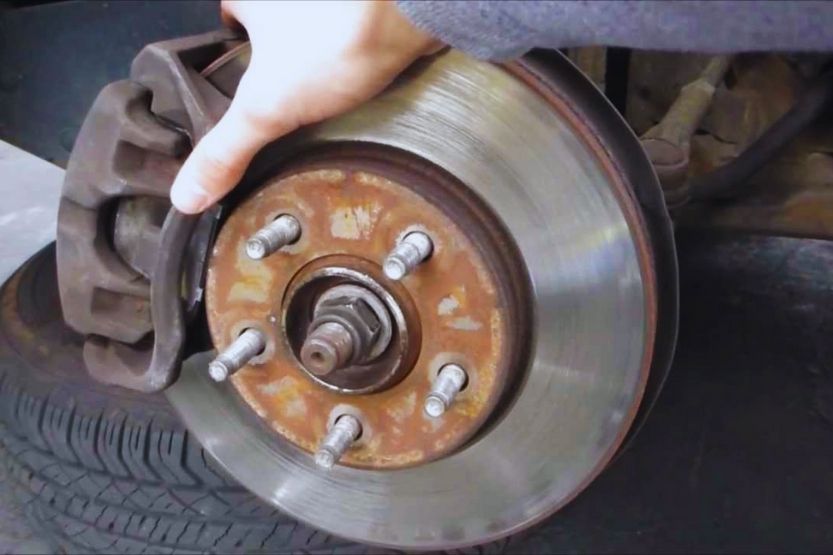
Metallic Ring That Houses Steel Balls
The wheel bearing is a metallic ring that houses steel balls, otherwise known as ball bearings, along with taper bearings. The wheel bearing itself goes inside the opening found in the center of a tire. Also, the wheel bearing must be attached to the axle shaft.
Connect the Wheels to the Rest of the Vehicle
Wheel bearings are essential to the vehicle because they connect the wheels to the rest of the vehicle without restricting their movement. Those wheel bearings make it possible for the wheels to continue spinning without being impeded by friction. You can also thank the wheel bearings for allowing the wheels to move at your desired speed.
Facilitate Smooth Acceleration and Maneuvering
Your vehicle relies on wheel bearings to facilitate smooth acceleration and maneuvering. They are also engaged when you step on your brakes. Throughout that time, the bearings also have to bear the weight of your vehicle.
It is impossible to overstate the importance of your vehicle’s wheel bearings. If one starts to malfunction, your vehicle will no longer run like normal. You must be ready to replace a faulty wheel bearing as soon as you possibly can.
How Much Does Wheel Bearing Replacement Cost?
How long does it take to replace a wheel bearing? We’ve already answered that question. That means we can now turn our attention to another important matter.
For this section of the article, we can focus on the cost of replacing your wheel bearings. We can break down your expenses into two categories. Let’s first talk about the cost of the wheel bearings themselves.
Replacement Wheel Bearing Prices
The traditional wheel bearings are the most affordable. They only cost $5 to $20 each.
Notably, traditional wheel bearings can be used for both your vehicle’s front and rear axles. They cost the same no matter where you need to put them.
Replacement wheel bearings may also be required for pressed-on units. Those are more expensive than the traditional bearings. They are priced in the range of $25 to $50. That same price range applies to wheel bearings required for rear-wheel-drive axles.
The most expensive wheel bearing types are the complete units. Those wheel bearings may be required for hub-style setups.
You can expect to pay at least $100 for those complete wheel-bearing units. If you need an incredibly elaborate wheel bearing, you may have to spend over $300.
Labor Expenses
You also have to worry about labor expenses if you’re getting a wheel bearing replaced. The total cost of labor will depend largely on the project’s complexity.
Mechanics can quickly complete simple installations. Labor expenses for those installations may only cost around $60 to $70.
More complicated installations take a lot of time to finish. Since the mechanics dedicate plenty of hours to your project, they will charge more. Don’t be surprised if your labor expenses reach $200. They can also top out at around $400.
Again, how long does it take to replace a wheel bearing? Depending on the vehicle’s make and difficulty, it will take around 20 to 45 minutes to replace a single wheel bearing. A mechanic has to maintain and adequately seal many parts to finish this work.
Wheel Bearing Replacement Cost [Front or Rear]
Should You Replace Wheel Bearings at the Same Time?
Only one of your wheel bearings may be presenting issues at the moment. You only need to worry about fixing that single malfunctioning component most of the time. Is that still the case when it comes to wheel bearings?
Since one of the wheel bearings is acting up, it would be logical to think that its counterpart on the other side will start to malfunction too. After all, they have been subjected to the same amount of wear and tear.
The argument for simultaneously replacing the wheel bearings is all about reducing the amount of time your car has to spend in the shop. You won’t be able to use your car for at least a chunk of the day as it’s undergoing repairs. Some might argue that losing their car for the entire day is okay at that point if it means the mechanic can replace both wheel bearings.
Then again, you can also put off the additional repairs if the other wheel bearing is still working fine. You can expect the other wheel bearing to start malfunctioning sooner rather than later, but putting off the repairs is an option. It may also be necessary if you’re in a hurry and cannot afford to send your car to the shop.
How Can You Tell if You Have a Bad Wheel Bearing?

A bad wheel bearing will make its presence felt. You can watch out for some symptoms, and we’ve detailed them below:
1. Different Kinds of Noises
Noises are the most common symptoms presented by bad wheel bearings. If you have a bad bearing, you will hear it. Notably, the noises produced by faulty wheel bearings are not always the same.
The noise could be very loud. It may be so loud that it will prove impossible to ignore. Those loud sounds are grinding noises so they will be very distinctive.
The sounds may also be reminiscent of cans with objects clanking inside them. You will likely hear that kind of noise if your faulty wheel bearings are driving over uneven roads.
Some noises are harder to detect because they may register as low growls. Those noises can be heard whenever you’re stepping on the accelerator.
2. Steering Wheel Issues
Issues involving the steering wheel may also arise if you have a busted wheel bearing.
While driving your car, you may feel that the steering is looser than usual. The driving experience will be different, and you may struggle with it. Get that issue checked out right away because you never want to be uncomfortable while you’re on the road.
The steering wheel may also vibrate because you have a bad wheel bearing. The shaking will intensify whenever you’re turning your vehicle.
3. ABS Warning Light Turns On
One more symptom you have to watch out for is the warning light for your anti-lock braking system (ABS) coming alive. The ABS is often connected to your wheel hub. Since the wheel hub is directly affected by the wheel bearing, the ABS will eventually sense something’s wrong.
Don’t ignore that ABS warning light. Check your wheel bearing as soon as that light turns on because there may be something seriously wrong with your vehicle.
Conclusion: How Long Does It Take to Replace a Wheel Bearing?
The information we’ve included in this article should help you answer the question of “how long does it take to replace a wheel bearing” and other relevant queries.
We’ve determined that the length of the project will depend on the location of the bad wheel bearing and the type of replacement component required. Labor costs can vary, so make sure you check with the mechanic beforehand.
A busted wheel bearing is an issue you must address as soon as possible. No one likes losing their car even for just a few hours, but that beats getting into an accident because you neglected necessary repairs.

![Rod Bearing [What is It, How to Replace It, and Replacement Cost] rod bearing](https://roadsumo.com/wp-content/uploads/2021/05/rod-bearing-150x150.jpeg)
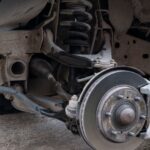
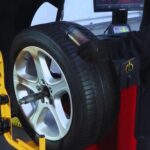
![CV Shaft [CV Axle Shaft Explained – And When to Replace] CV Shaft](https://roadsumo.com/wp-content/uploads/2021/12/CV-shaft-150x150.jpg)
